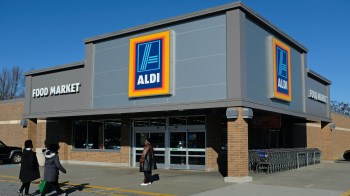Is commercial real estate next to fall?
TEXT OF STORY
Kai Ryssdal: The crisis in residential real estate we all know. That story’s been out there for a good couple of years now. But even a quick listen to one of the business news channels in the last several months will have alerted you to the next big economic story.
TV MONTAGE: All right, a major downturn is expected in commercial real estate in the next few years. … It is truly a slow-motion car crash here. … It is going to be a torpedo in mid-shift. … It is going to be a major blow, might be the next shoe to fall in. … If you were to say what is one of the most ominous overhangs in the market right now, it would be the commercial real estate and the threat of a whole wave of defaults coming through….
We asked Marketplace’s Jeremy Hobson whether those dire warnings have any truth to them.
JEREMY HOBSON: Unemployment will probably hit 10 percent by the end of the year. That means fewer workers, which means less demand for offices and stores. In other words, the commercial real-estate situation isn’t getting better. It’s getting worse.
KEN LORE: The problem is real, it is serious, I don’t think we know when the other shoe is going to drop, if you will.
Ken Lore is co-chair of the real estate department at the law firm Bingham McCutchen. He says as vacancy rates go up, property values are falling. So just like in the housing crisis, commercial mortgages are going underwater. Borrowers owe more than the value of their properties. And potential buyers can’t get loans from the banks.
LORE: It’s hard for people to buy or sell real estate. Or if they do buy or sell, they have to sell at lower prices because the people that are buying are going to have to put up more equity and less loans.
Perhaps nowhere is the drop in property values as severe as it is here in Manhattan’s Stuyvesant Town. I’m standing in a 11,000 apartment commercial property that sold for $5.4 billion in 2006. Today, it’s worth less than half that. Who’s on the hook if borrowers default? It’s the banks.
CHRIS CORNELL: As the old quip goes, if you owe the bank a million dollars, you’re in quite a bit of trouble. But if you owe the bank a billion dollars, the bank is in quite a bit of trouble.
Chris Cornell is a commercial real estate expert at Moody’s Economy.com. He says the nightmare scenario is that a spike in commercial loan defaults could send the banks into another financial crisis.
He says that’s exactly what happened last month, when Corus Bank in Illinois was seized by the federal government.
CORNELL: We fear that sort of phenomenon is going to play out in bank after bank throughout the country.
Now, when economists talk about the other shoe dropping, they’re talking about the renegotiation of commercial loans. Many of these loans mature after just five years. During the boom, banks had no problem extending the loans because the price of real estate was going up. Not anymore, Cornell says.
CORNELL: The worst of the bubble in this market was ’05, ’06 and ’07. Adding five years, that means the trouble is expected in 2010, 11 and 12.
In other words, that shoe is dropping pretty slowly and giving banks time to shore up their finances and prepare for losses.
Hessam Nadji directs research for Marcus and Millichap Real Estate Investment Services in California. He says in the meantime, banks are holding the loans on their books at full value and employing a tactic you might call “delay and pray.”
HESSAM NADJI: The bottom line is lenders are, as a result, extending loans and trying to avoid short-term additional losses until they get stronger and have the wherewithal to start to process some of the undervalued real estate.
He says the good news is unlike in the housing market, there wasn’t as much overbuilding in commercial real estate, so getting back to normal will be easier.
Susan Wachter is a professor of real estate at the Wharton School. She sees no risk of the kind of system failure we experienced last year.
SUSAN WACHTER: The commercial real estate crisis isn’t going to bring capital markets to a halt.
She says the commercial market is only a third the size of residential, and distressed commercial property owners are likely still collecting rent. Income is still flowing in.
WACHTER: Putting the property into default foreclosure would stop that income flow. It’s not in the interest of either the lender or the manager/owner of the property. There’s much more likely to be negotiations among these parties.
Other than some rainfall, Stuyvesant Town is pretty peaceful today. But high-stakes negotiations between the owners and their lenders continue. Wachter says for a recovery to happen, banks will have to loosen lending again. Making that happen in housing has required hundreds of billions of dollars from the government. It seems commercial real estate may need a dose of the same medicine.
In New York, I’m Jeremy Hobson for Marketplace.
There’s a lot happening in the world. Through it all, Marketplace is here for you.
You rely on Marketplace to break down the world’s events and tell you how it affects you in a fact-based, approachable way. We rely on your financial support to keep making that possible.
Your donation today powers the independent journalism that you rely on. For just $5/month, you can help sustain Marketplace so we can keep reporting on the things that matter to you.


















